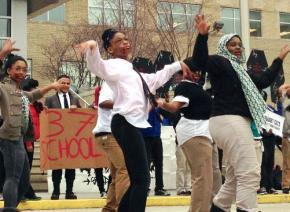Will they gut Philly schools?
and report from Philadelphia on a turnout by hundreds of angry students and activists to protest the closure of dozens of public schools.
AS THE struggle against corporate school deform heats up in Seattle with the teacher boycott of the MAP test, people in Philadelphia are gearing up to keep our school system from being destroyed.
Some 300 community members, parents and activists rallied January 17 at a meeting of the city's School Reform Commission. They were expressing their frustration and anger at the city's decision to close 37 public schools--one out of every six in the city.
In all, the city plans to close or consolidate 15 percent of schools to overcome what it says is a $1.1 billion budget deficit over the next five years. Activists, however, say the numbers don't add up--and that the district is approving an expansion of charter schools, using public money, even as it claims poverty.
Philadelphia's Democratic Mayor Michael Nutter has given his "full and unequivocal support" to the school closings.
According to Philly.com, an analysis by the Philadelphia Coalition Advocating for Public Schools found that 81 percent of the 15,000 students expected to be affected by the closings are African American. Although 56 percent of Philadelphia public school students are African American, "most of the schools that would close--24--have populations that are more than 90 percent African American. Just three of the schools have white populations higher than the district average." Likewise, "the group also found that most of the schools targeted also have district higher-than-average populations of poor and disabled students."

THE PLANNED school closings in Philadelphia are just one front in a full-blown assault on public education, which is currently being felt in urban and working-class neighborhoods of our nation's largest cities. The attack especially impacts students like Gladysann Rodriguez, who attends Charles Carroll High School, located in the city's Port Richmond section. Carroll High School is one of the schools slated for closure.
When asked why she came out to the meeting of the School Reform Commission, Rodriguez explained, "I'm out here to support my school. I mean, what they're doing is outrageous. I have a son, and with them closing all these schools, they're leaving nothing for my son. I'm a student, and I know how hard it is. They don't know how hard it is to go to school and have to take care of a child at the same time."
With her voice beginning to shake and tears streaming down her face, Rodriguez added, "It's not right...I worked hard to get to where I'm at now--and all they're doing is pushing me 10 steps back, making it harder for me to graduate and to create a future for myself."
The activists, community members and parents who rallied against the school closings have listened to the voices of young people like Gladysann Rodriguez in their neighborhoods--and know the kind of devastation that the planned closures will cause.
Students like Rodriguez point to the fact that neighborhood school closings will put additional burdens on low-income students in particular, who will have to travel longer distances, sometimes through unsafe neighborhoods, just to attend school.
Tesha Vidra, another high school student and young mother who attends Charles Carroll High School, explained that her own daughter is approaching elementary school age. "I don't want her to be having to travel through these unsafe neighborhoods because [the city wants] to be selfish and not give up the couple extra dollars that they have," she said.
"They're not realizing how many students they're actually pushing out of schools," she added. "A lot of students have already said that they will drop out if their schools are shut down--that they feel unsafe going to these other schools."
The first hour of the School Reform Commission meeting felt like a photo-op, with school administrators--among them, new Superintendent William R. Hite Jr.--repeatedly posing for photos with high-achieving students from neighborhood charter schools. Parents and activists from neighborhoods that are losing their schools became outraged at the time spent taking pictures. Some yelled from the audience, "We all deserve opportunities like this!" and "We didn't come here for a photo shoot!"
Protesters continued to make their voices heard throughout the evening, disrupting the meeting many times with chants of "Save our schools!" Activists are vowing to continue the struggle to provide all of Philadelphia's students with the right to a safe and equal education.


